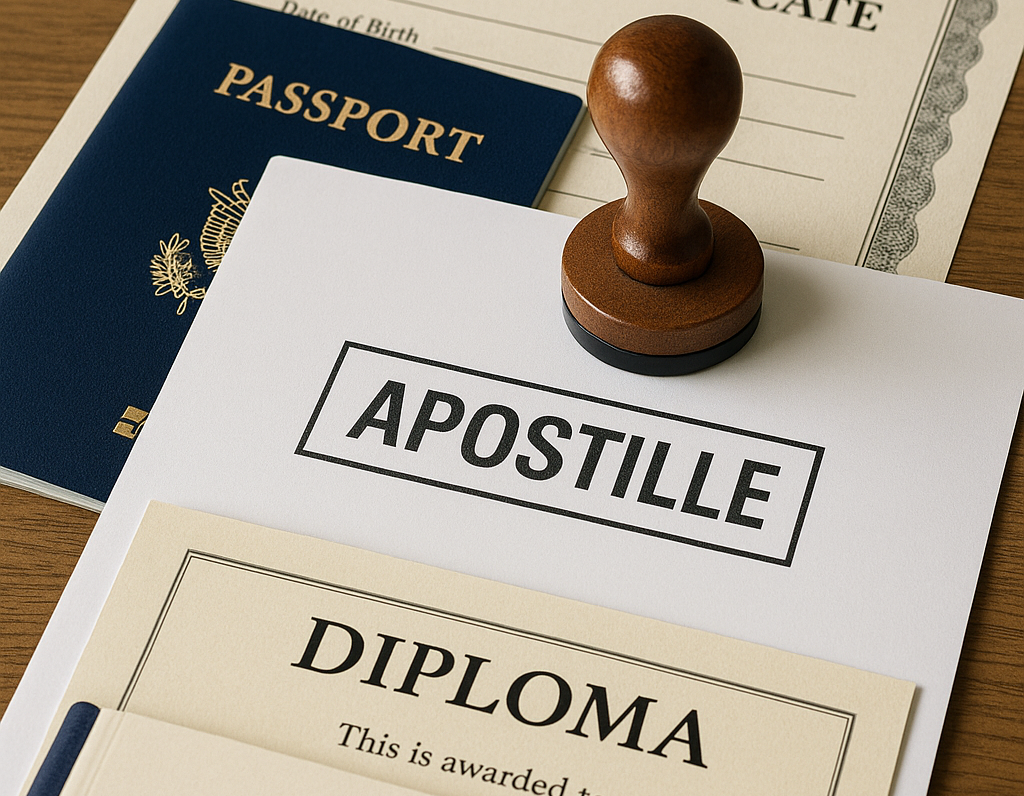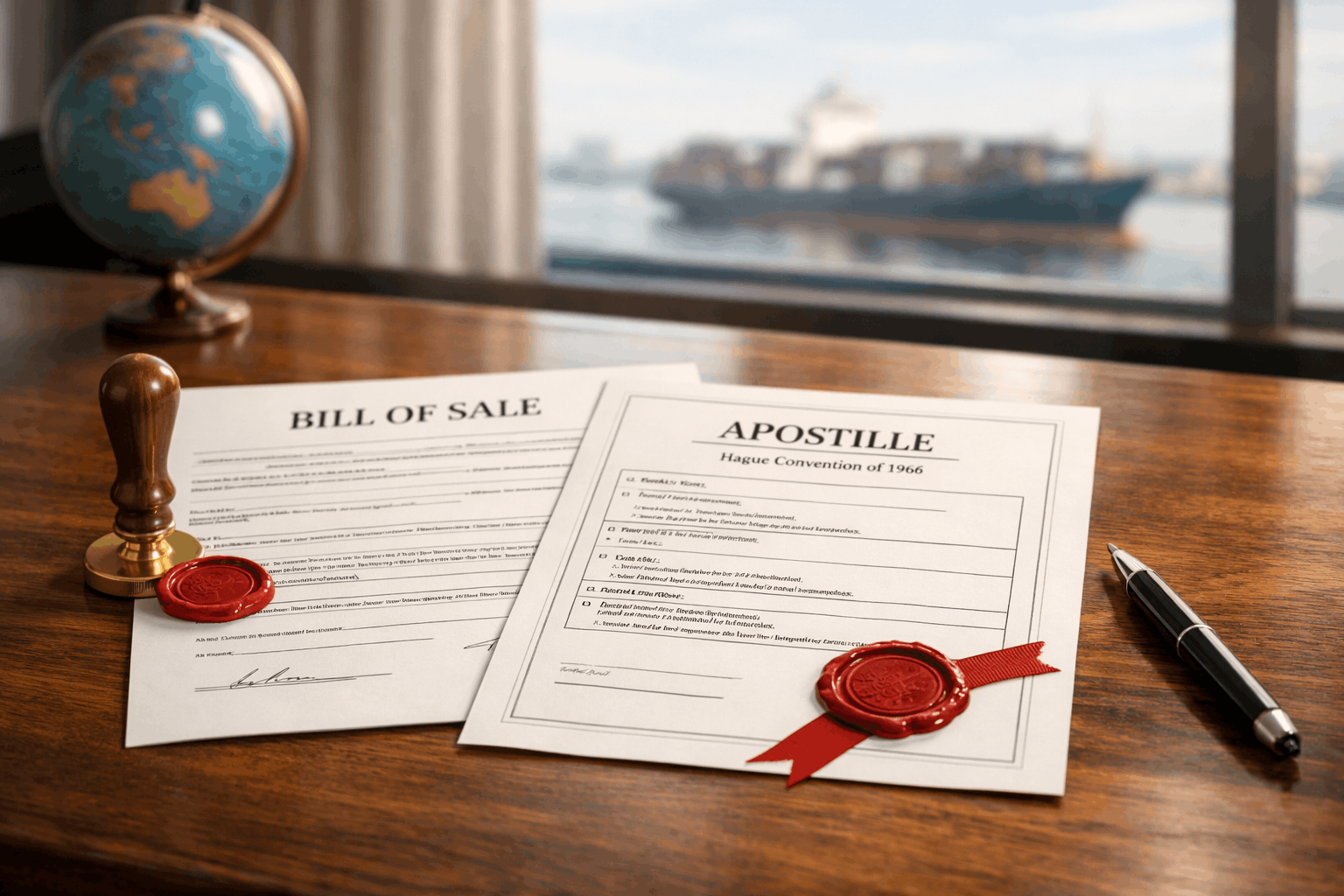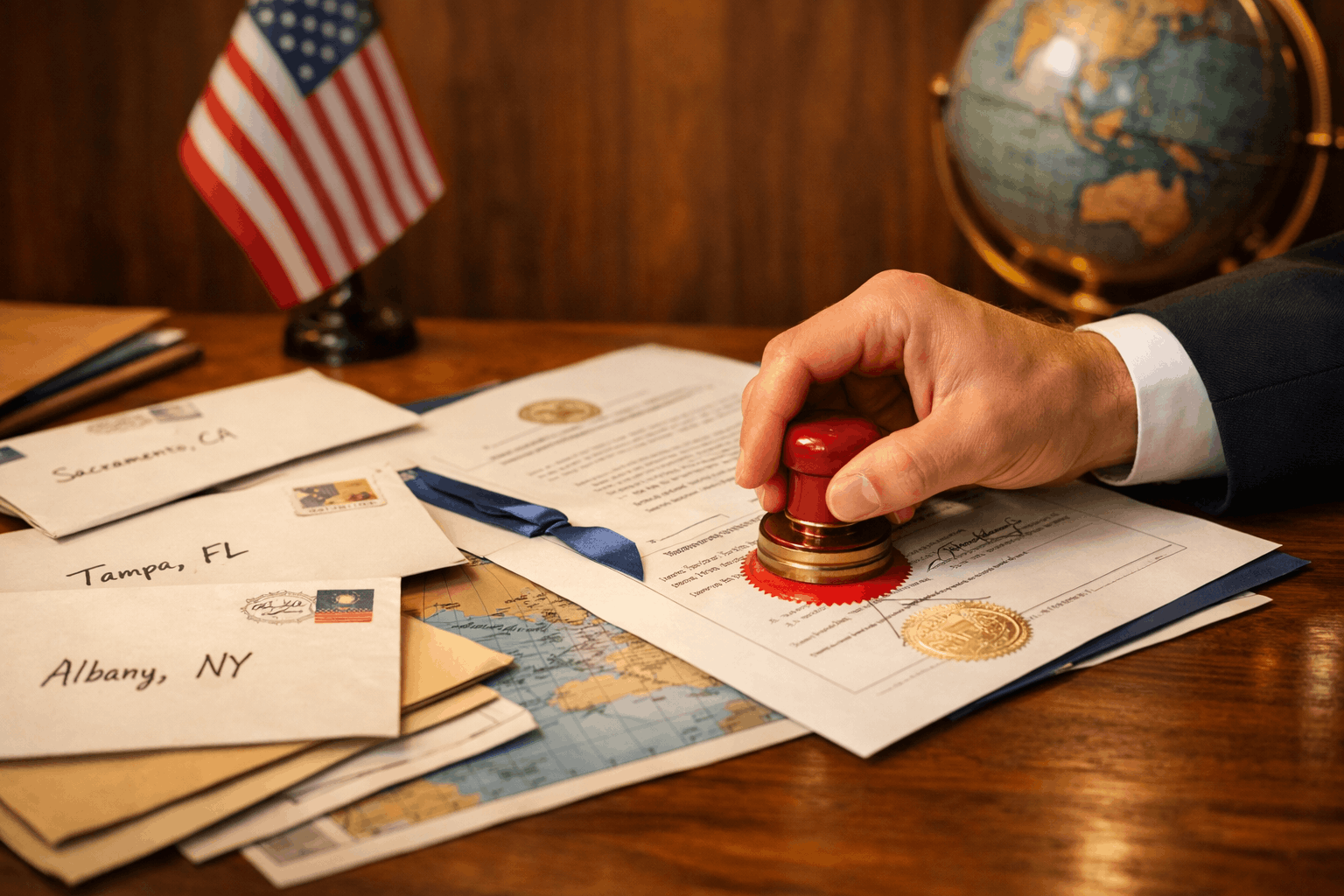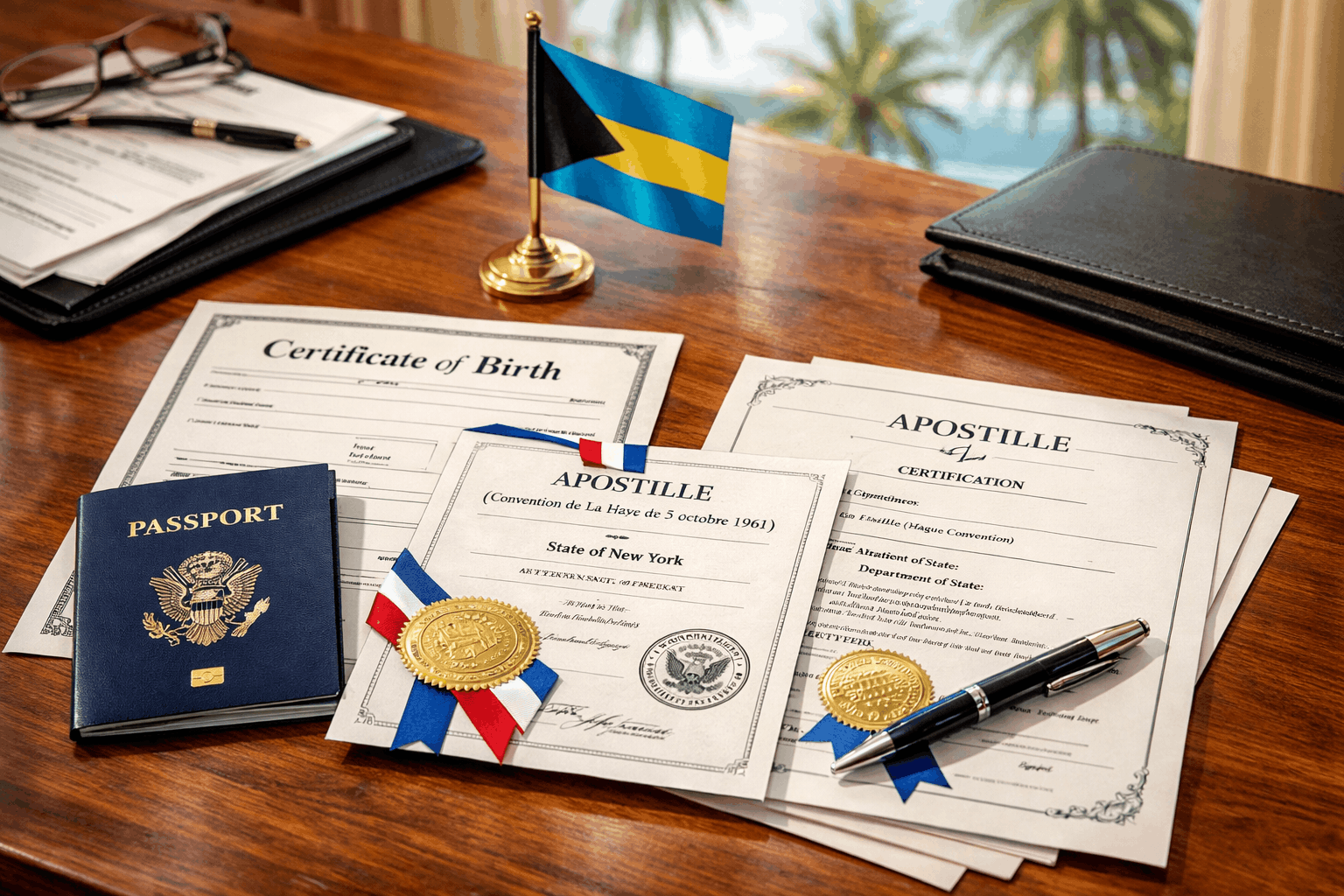
What Documents Need an Apostille
It’s common to wonder what documents need an apostille when preparing paperwork for international use. From dealing with personal matters to cross-border business transactions, understanding the apostille requirements by document type is key to passing the authentication process in a timely and effortless way. This post looks into apostille documents by category and clarifies when an apostille is required. Let’s clear the fog and make your global journey simple without breaking a sweat!
Categories of Documents That May Require an Apostille
Not sure how to know if a document needs an apostille? Generally, it depends on whether the paper is an apostille document type, and we’ll discuss the six types in detail below. Getting familiar with these categories enables you to begin the apostille process confidently. Below is a breakdown of the most frequently apostilled document types.
Personal and Civil Documents
Essentially, official records issued by a public agency that verify your identity or personal status might need authentication. Examples include:
- Birth certificates
- Marriage licenses and divorce decrees
- Single status affidavits
- Death certificates
- Police clearance
For instance, if you plan to get married in Spain, you’ll likely need to apostille your birth certificates and single status affidavits. Additionally, marriage certificate apostilles are necessary for spouse visas or citizenship applications.
Educational Documents
When you plan to travel abroad for study or work, apostilles for your educational documents are often required to prove your academic credentials. This category typically involves:
- Degrees and diplomas
- Academic transcripts
- Professional licenses
- Acceptance letters
Suppose you finalize a job offer abroad and your employer requests validation of your academic history. A university diploma apostille ensures the smooth recognition of qualifications across borders.
Corporate and Commercial Documents
Expanding your business to another country? Your corporate and commercial paperwork might need apostille certification to confirm the company’s legal standing before foreign authorities or partners. Documents in this category often include:
- Articles of incorporation
- Powers of attorney
- Financial statements
- Contracts and agreements
- Tax filings
- Certificates of good standing
Proper certification helps clarify your business’s legitimacy and intentions, allowing for trust-building and facilitating cross-border operations.
Trade and Shipping Documents
Global trade relies heavily on document authentication, so securing an apostille for items like certificates of origin or customs declarations keeps you away from delays and issues. Such paperwork might be:
- Product certifications
- Commercial invoices
- Certificates of origin
- Packing lists
- Bill of lading
Whether you plan to export products or receive international freight, having apostilled trade and shipping documents paves the way for the supply chain to run smoothly and ensures trouble-free international transactions.
Intellectual Property Documents
These records safeguard your creations abroad — inventions, artistic works, or brand assets. The apostille authenticates ownership when asserting rights overseas. Some regular IP documents that might need this certification are:
- Trademark registrations
- Patent certificates
- Copyrights
- Licensing agreements
For example, if you’re facing a legal dispute overseas involving a product patent, an apostilled patent certificate supports your legal claims internationally.
Legal and Notarized Documents
In addition to the above categories, notarized records intended for use in legal matters abroad often require apostilles as well. Among them are:
- Court orders and rulings
- Notarized contracts and agreements
- Affidavits
- Sworn statements
If a notary public signed your document and it’s required for a legal proceeding abroad, chances are it will need an apostille. The apostille acts as formal validation for legal paperwork, ensuring your papers are enforceable in global settings.
How to Determine If a Document Needs an Apostille
Once you’re familiar with the types of documents for the apostille, the next step is to verify whether your specific document qualifies for an apostille request. To figure out, consider where the document is headed and its nature. Ask yourself two key questions: Is the destination country part of the Hague Convention? And what type of document is it — public, private, or commercial?
Is the Document Going to a Hague Convention Country?
First, find out if the country you’re sending the document to recognizes the Hague Apostille Convention. Over 120 countries across the globe accept the apostille as a valid document authentication, eliminating the need for lengthy legalization. If your paperwork is intended for one of these countries, the single-page apostille is everything you need to prove its authenticity.
In contrast, if the receiving country isn’t a part of the convention, apostilles won’t satisfy the authentication requirements. In this case, you may need to go through a different path, typically involving another form of verification and consular legalization. Reach out to foreign authorities to inquire about the specific requirements. Still unsure? The U.S. Department of State provides an updated list of Hague countries, so run through it to see if your destination country appears.
Is the Document Public, Private, or Commercial?
The nature of your document plays a major role in whether it qualifies for an apostille. Public documents refer to those recorded by government bodies, often required for identity and status verification. Thus, before sending your birth certificate or marriage license abroad, you’ll likely need to get an apostille first. Private documents, on the other hand, usually need an extra step of notarization for apostille certification. Examples include personal agreements or sworn statements.
Commercial documents, as the name suggests, are issued for business purposes, such as contracts and invoices. They need proper apostille authentication before using in the international context, as well as other additional certifications from relevant agencies if required. All in all, understanding these three distinctions allows you to determine what validation steps to make. When in doubt, consult with your state authentication office for proper processing.
Key Takeaways on Apostille Requirements
International documentation is a lot easier if you understand what documents need an apostille. By using this apostille guide for documents, you can identify common categories, such as personal certificates or commercial filings, and decide whether apostille certification is required. Also, remember the two key factors: the destination country and the nature of your document. You should consider them when determining if you need an apostille or not.
If an apostille is necessary in your case, secure it to achieve personal milestones and handle overseas business without friction. Don’t forget you can contact our professional team for personalized support — no hassle, just plain sailing ahead!
Frequently Asked Questions (FAQ)
Can a photocopy of a document be apostilled?
Only if it’s a certified copy, meaning the copy must be notarized or certified by an authorized agency. Thus, plain photocopies won’t be accepted as they don’t meet the state requirements.
Do apostilles expire?
No, apostilles don’t come with an expiration date. However, some foreign authorities might have policies about fresh apostilles, especially when the original document was issued a long time ago. Always check the timeline to ensure your apostille is accepted.
Can I obtain an apostille for documents issued in another state?
No, you can’t apostille a document that comes from another state. Each state is only authorized to apostille its own records. In this case, send your document to the state where it originated for an apostille.
What if the destination country isn’t part of the Hague Convention?
You’ll need consular legalization instead since apostilles won’t be valid in non-member countries. This route typically involves state and/or federal authentication, followed by extra certification from the destination country’s embassy or consulate.
Can I apostille electronic or digital documents?
In certain cases — yes. If your state permits e-apostilles, you can submit digitally notarized documents for apostille processing. Refer to the specific e-document policies of your state before sending an apostille request with your electronic documents.





